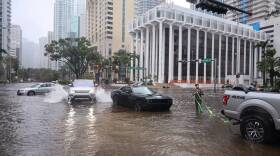-
The mayors of St. Petersburg and Tampa met at the Palladium to discuss how their cities are dealing with climate change.
-
We discuss climate hurdles and solutions with CNN's chief climate correspondent, and highlight Florida stories from his book.
-
Usually, the hottest time of the year is the first and second weeks of August but this weekend's temperatures peaked at 112 degrees heat index.
-
Scientists say temperatures that have gone "crazy haywire" hot, especially in the Atlantic, are close to making the current global coral bleaching event the worst in history. It's so bad that scientists are hoping for a few hurricanes to cool things off.
-
Existing coal and new natural gas-fired power plants that run more than 40% of the time will have to eliminate 90% of their carbon dioxide emissions.
-
In the last 80 years, sea level rise has risen about a foot. According to the National Oceanic and Atmospheric Administration, that pace is expected to speed up.
-
While Gov. DeSantis said he's "rejecting the agenda of the radical green zealots,” a climate activist says Florida is digging its "head in the sand."
-
The governor had vowed, as a former presidential candidate, to replace the words “climate change” with “energy dominance” in national security and foreign policy guidance.
-
In the 1900s, swamps and low-lying areas were drained to create more space for development and farming.
-
Climate change is pushing Florida’s native marine species into new regions across the state. You can call them the new natives.
-
Longleaf pine conservation is considered a key part of climate resilience for Florida and the Southeast. But when it comes to climate change, longleaf pines are not out of the woods.
-
A new report by scientists from four major Florida universities, says that the wildlife corridor — if completed — will not only allow wildlife to survive in the coming decades, it will make climate change less destructive to humans.
Play Live Radio
Next Up:
0:00
0:00
Available On Air Stations












